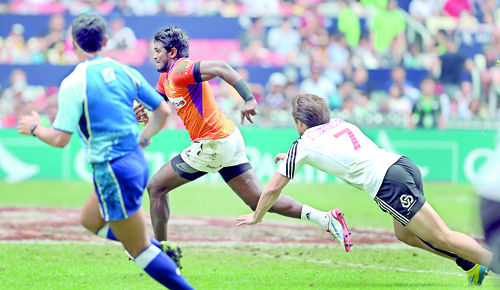Rugby referee – hero, villain or judge
View(s):A very interesting exchange occurred between the referee (not in Sri Lanka) and a player in a recent match where the player yelled “you are incompetent”. The referee retorted calmly that “if I was, I would never be a referee for a match like yours”. Simply people have to remember that school rugby ‘is not the World Cup’.

The worrying trend of making the referee the scapegoat in defeat, for losing control, lacking authority or just not being up to it continues - File pic
The rugby derby of Gloucester vs Bath has never been a tame game. This year it ended almost in a blood bath. Brian Moore commenting in the Daily Telegraph reported as follows: “The rugby derby, Gloucester vs Bath is never a tame affair and the game this year was no exception. Gloucester finished with only 11 men on the pitch. A full-blooded, but highly unsatisfactory, encounter produced little good rugby but a lot of controversy. Bath had three players sent to the sin-bin; Gloucester two and two sent off. The reaction to all this mayhem has been interesting. The consensus of the written press appears to be that it was in large part the fault of the referee, Tim Wigglesworth.
Moore went on to ask, “What does this amount to? No more than a continuation of the worrying trend of making the referee the scapegoat in defeat for losing control, lacking authority or just not being up to it. It is the fault of the players, who contrived to commit one horrendous high tackle, cynically killed the ball in the red zone or dealt out punches as if in a bar brawl. Tell me this – what is a referee supposed to do when this happens?
“After issuing a full range of sanctions and thereby indicating to players that they should not re-offend if they want to stay on the field, what can he practically do to stop players breaking the law? And when they do, ignoring the clear warning is he not to issue cards because when totted up the number is embarrassing?”
Seven cards and 30 penalties may add to a tidy sum and we have seen this happen locally too. Then everybody steps on the referee as though he is the villain. As Brian Moore wrote what is the referee to do? It may be easy to say he should have managed the game better. It is simply unbelievable why it is not done if it was that easy. Drill down deeper as du Pont suggests for financial analysis of the firm; in looking to find reasons for the behavior of the top most ratio.
 Following my article of last week I received feedback from some parents and supporters whose view is that there is too much pressure on the boys to perform. This comes from a number of corners of the ring and includes the coach, the administrators and the various influential actors of the game that bring the money for the big budget. Parents believe that the players are sometimes directed to situations which are too hard for schoolboys. At the end of the day it is the expectation based on amounts spent and that is what those who spend measure.
Following my article of last week I received feedback from some parents and supporters whose view is that there is too much pressure on the boys to perform. This comes from a number of corners of the ring and includes the coach, the administrators and the various influential actors of the game that bring the money for the big budget. Parents believe that the players are sometimes directed to situations which are too hard for schoolboys. At the end of the day it is the expectation based on amounts spent and that is what those who spend measure.
Then there is pressure by those who are paid to get a job done and their only key performance indicator is the number of wins or the annexing of a trophy. If not the head might be on the chopping board.
This intense feeling will escalate as we approach the last two weeks and the super league thereafter. Already we hear of complaints after the matches are lost. We have heard of the manifestation of the deviant subculture cloaked in the garb of tradition resulting in a team losing their players and with it their performance.
As we go on, we may see the forms of irrational hatred and or an exaggerated display of pseudo masculinity that leads to trouble. This very often happens from those influential sectors attached to the game. The tragedy is that it spills on to the field to the young charges playing rugby.
Is the physical approach to the game the answer to a win situation or is there a need for a psychological approach; that is being mentally prepared. At the highest level of sport, performance success is consistently differentiated by an athlete’s display of psychological qualities and effective use of mental techniques (Gould, Eklund, & Jackson, 1992). We see this neglected while children practice, practice and practice and are let unto the field and have to look at touch lines to ask ‘what to do’.
Is the joy out of sport taken out by ‘hysterically’ yelling at the young children from the touchline? The present scenario some lament as damaging the student’s enjoyment of rugby, by failing to behave in a sportsmanlike manner.
The dread of the schools rugby season was towards the end of last year. The question is whether we are nearing that point this year which has been so far so good. That does not mean that there have not been complaints without which there will not be a single season. It must be remembered that this is a time for school boys and that those around should not get ‘too emotionally involved’.
Little do some realize that ecological system around rugby has and can have a lasting effect? The irrational behavior could damage the confidence of some children while turning others into ‘bullies’ who struggle to understand the basic concept of fair play.
* Vimal Perera is a former Rugby Referee, Coach and Accredited Referees Evaluator IRB


